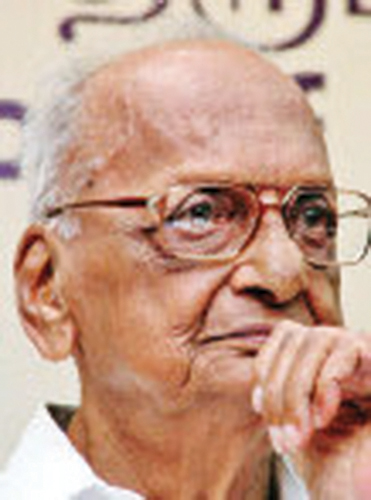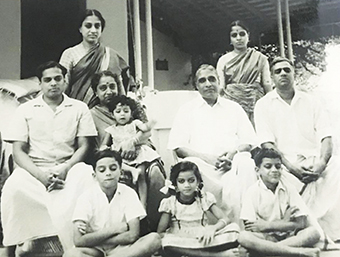Textool Balasundaram (1913 – 2009) was a top technocrat. He was first to indigenously produce textile spinning equipment in India. The UK educated technocrat had been responsible for the large scale industrialization of Coimbatore. His good work resulted in mass employment. Once upon a time the people in harness used to acknowledge his role in the society. He had also worked on a charkha for the spinners in the villages. The Sheffield educated Balasundaram lived with his wife Kamalam on Avinashi Road and was known for his deep thinking. He was an avid reader and had written on a number of subjects including Thirukkural. D.Balasundaram belonged to a rare tribe of thinkers and was multi faceted.
‘Thiruvalluvar Kanda Hindu Samayam’ was written by D.Balasundaram in the year 1968. The 42 page booklet would serve as a guide for the aspirer. Balasundaram was a man of science and therefore he could understand religion, philosophy and spirituality very well. The book has been rendered in Tamil by the scholarly industrialist. He calls the Thirukkural as Tamil Marai while stating that a number of people have written treatises. Balasundaram goes on to state that a number of scholars were of the opinion that Thirukkural was a secular work but he goes on by mentioning that it becomes essential to submit facts based on modern science by also trying to explain the ten kurals which are connected with ‘Kadavul Vazhthu’ or praise of God.
He calls Hinduism by its old name ‘Sanatana Dharma’ and emphasizes that it contains the truths applicable to all ages. Therefore it is important that it is incumbent to understand ‘Sanatana Dharma’ in a fresh manner.
The scholarly industrialist mentions that the treatises of Adi Sankara, Ramanujacharya and many others have added value to the civilizations through the many treatises written over centuries. It is therefore his contention that old books will have to be looked with new eyes. Now let us briefly look at some of the points elucidated by D.Balasundaram.
“ It becomes incumbent upon us to use concepts connected with religion and spirituality because it is not possible to see everything just through experiments. Similarly religion has to accept the facts that have been discovered with the aid of science. Yoga Vasishta tells us that truth can acceptable to us after sufficient study and research. Hindu religion is only faith that has prescriptions for all age groups, people of diverse characteristics. It helps us to attain the goals of life which are known as ‘Purusharthas’.
The goals are known as Dharma or righteousness, Artha or acts required for survival, Kama which can be equaled to indulgences and Moksha or liberation. The Hindu religion has three important texts and they are known as Presthanathrayam – Upanishads, Brahmasutram and Bhagavad Gita. The Bhagavad Gita elucidates on the points found in the Upanishads and Thirukkural is a compendium of thoughts which are found in the instructions of Lord Krishna.
Times progressed and Saint Ramakrishna was born in Bengal. It was during the same time that Vallalar and Dhandapani Swamigal served the southern part of the country. Dhandapani Swamigal has put down his experiences in a manner which can be scientifically researched while doing his books. Therefore we can take his words as modern evidences for the texts connected to the Hindu religion”.
In the verse ‘Agara Mudhala Ezhuthellam Adi Bhagavan Muthattrae Ulagu’ Valluvar mentions that just as how the alphabet ‘Agharam’ is the basis for the alphabets, similarly God is the fundamental being who is behind our existence. The world has a lot of good and bad in it. God would not have created the bad things. This was the contention of Valluvar and the same concept is echoed in the thirty third verse in the tenth chapter of the Bhagavad Gita. Krishna calls himself as the ‘Agharam’ among the alphabets and that he delivers the fruits of karma or action to the populace. The Bhagavad Gita does not agree that what is good for the human being and what is bad for the human being is bad. Balasundaram quotes Valluvar again – The purpose of learning is lost if one does not salute God who is found in the form of pure knowledge. Balasundaram refers to both the Gita and kural while stating that doing ones duty without any expectation is the only way to end sorrow.
He also states that God is resident in the hearts of the faithful. In the chapter ‘Anbe Deivam’ (God is Love), Balasundaram states that Valluvar talks about devotion helping one to be free of the results of karma (action).
The author states that if one has to win over one emotion, then a different one will have to be used to overcome the existing or bothering one. He draws our attention to the fact that all our difficulties originate from the people or eco system around us.
If we show affection towards these souls, we will not suffer because of our senses. The power of penance is brought out well in the chapter ‘Dhavathin Sakthi’, wherein the author D.Balasundaram states that the one who controls his sense organs through the same will succeed in the paths of devotion and wisdom besides living long.
Eckart states that the one who search for God in a form, attain the form but they miss out the divinity present in the form. Balasundaram adds by bringing in a verse from the Gita which talks about this concept.
—Rajesh Govindarajulu
—To Be Continued
Textool Balasundaram’s Creative Work On Thirukkural – Part I




